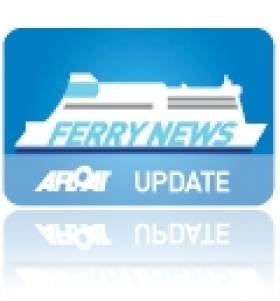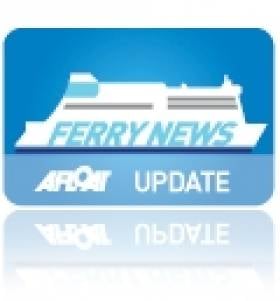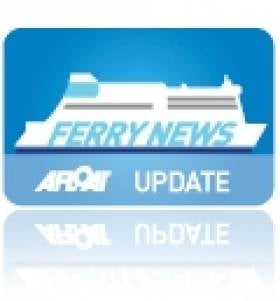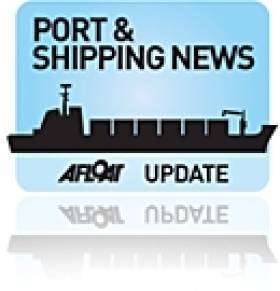Displaying items by tag: Norfolkline
Irish Sea 'Racehorse' Returns
Dawn Merchant and Brave Merchant represented the first pair of the 'Racehorse' class quartet of ro-pax sisters commissioned for the Cenargo Group. The quartet were built by Spainish shipbuilders Astilleros Espanoles SA in Seville, noting the first pair at 22,046grt where slightly smaller in tonnage terms compared to their 22,215grt counterparts Midnight Merchant and Northern Merchant. Upon delivery in 2000 the second pair were chartered to Norfolkline's Dover-Dunkerque route.
With a 130 truck capacity the Norman Trader can handle a marginally higher number of freight vehicles compared to the Norcape which handled 127 trucks. The Norcape, a 32-year-old freight-only vessel,was stood down in February and remains laid-up at Liverpool's Huskisson Dock. Incidentally, Norman Trader has joined one of her Racehorse class sisters, European Endeavour (formerly Midnight Merchant) which had directly replaced the Norcape on the central corridor route.
Likewise the European Endeavour is no stranger to the Irish route as for the last two years she has acted as winter relief vessel to cover the refits of the routes Dutch built ro-pax sisters Norbay and Norbank. The latter vessel is now undergoing a refit by Cammell Laird Shiprepairers in Birkenhead, now that the Norman Trader is in service to maintain the three-ship operated 8-hour route.
The Norman Trader had arrived into Dublin Bay last Friday from London's Tilbury Docks, on the next day she entered Dublin Port. In recent years she has operated on English Channel routes for the French shipping giant Louis-Dreyfus Armateurs through their ferry division LD Lines.
Norman Trader's (Dawn Merchant) sister Brave Merchant now renamed Norman Bridge also runs for LD Lines 'Motorways of the Seas' (MOS) route across the Bay of Biscay between Nantes /St. Nazaire to Gijón in northern Spain. The 14-hour route which started last year, which was run iniatially as a joint venture between Grimaldi Lines and Louis-Dreyfus and traded as GLD Atlantique.
- Dublin Port
- Bay of Biscay
- irish sea
- Ports and Shipping News
- Birkenhead
- Norcape
- RoPax
- DublinLiverpool
- Norfolkline
- FreightFerry
- Motorways of the Sea
- Norbank
- Norbay
- MOS
- European Endeavour
- Central Corridor
- P&O Irish Sea
- Norman Trader
- LD Lines
- Merchant Ferries
- Cenargo Group
- RaceHorse Class
- Tilbury Docks
- Cammell Laird
- Aintree
- Grand National
- Aintree Grand National
Seatruck Sailings Start on Dublin-Heysham Route
The vessel has accommodation for 12 drivers. Most of the daily sailings depart Dublin at 15:15hrs and return from the Lancashire port at 02:15hrs. On certain days the schedules vary, to view the timetable click here.
In addition to the new route for Seatruck Ferries, the freight-only operator has a fleet of 8 vessels on routes between Dublin-Liverpool, Warrenpoint-Heysham and Larne-Heysham.
Anglia Seaways arrived into Dublin yesterday morning from Avonmouth Docks, where the 120 unit capacity vessel went into temporary lay-up period, since departing the Irish capital on 31 January (see related posting and photo).
The 13,073grt vessel revived the 8-hour route yesterday with an afternoon sailing bound for Heysham. The vessel was originally reported to be relocated to Baltic Sea operations, but with its charter to Seatruck, the DFDS Seaways funnel symbol of the Maltese cross was painted out.
Though, the Maltese cross can still be seen in Irish ports with calls made by sisterships, Dana Gothia (ex. Maersk Westland) and Dana Hollandia (formerly Maersk Waterford) which are part of the DFDS Group container subsidiary DFDS Logistics.
In total the Lo-Lo shipping division operates four vessels on several routing options with weekly calls to Belfast, Dublin, Cork and Waterford to Rotterdam and Zeebrugge.
The German built sisters originally operated Dublin-Rotterdam and Waterford-Rotterdam routes for Norfolk Line (a subsidiary of Maersk / A.P. Moller Group).Incidentally Maersk /Norfolkline also owned the Anglia Seaways until DFDS Seaways purchased the vessel last year.
DFDS Seaways Makes Final Irish Sea Departure
The ro-pax Dublin Seaways made a last crossing with a Saturday morning arrival at Birkenhead. After disembarking passengers, vehicles and freight traffic, the 21,856grt vessel immediately departed the Mersey for a short-term deployment on the company's North Sea Rosyth-Zeebrugge service.
Sistership, Liverpool Seaways also completed her last crossing to Birkenhead with an overnight Saturday sailing. This was the final scheduled sailing under DFDS Seaways ownership and marked the last foot-passenger crossing on the Liverpool route as rival operators P&O (Irish Sea) and Seatruck Ferries do not cater for this market.
The vessel returned to Dublin yesterday from Birkenhead; this was to facilitate the loading of drop-trailers and terminal based tugmasters (engine-driven truck/cabs) that tow unaccompanied trailers on the roll-on roll-off vessels. After a short turn around at the terminal, Liverpool Seaways departed Dublin, bound for Immingham. The UK east coast port is where DFDS operate an extensive freight route network across the North Sea.
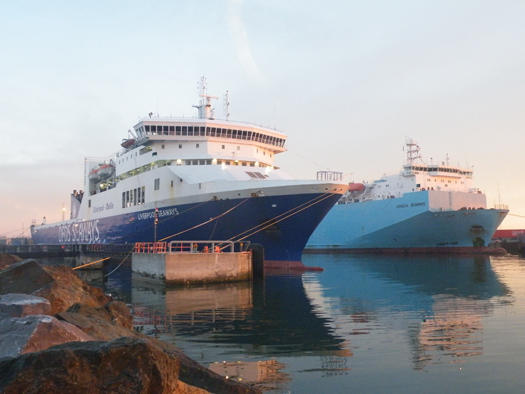
The ro-pax Liverpool Seaways and freight-ferry Anglia Seaways berthed in Dublin Port yesterday prior to sailing away from the Irish Sea. Photo Jehan Ashmore / ShipSNAPS
In addition the 13,704grt Anglia Seaways also docked in Dublin yesterday from Heysham to perform similar duties like the Liverpool Seaways. Several hours later, the 114-trailer capacity vessel set a southbound course past The Muglins, bound for Avonmouth.
DFDS cited its decision to exit entirely from Irish Sea sector due to the sharp decline in the Irish and UK economies in 2008 and 2009. The company suffered continuous losses on its remaining routes and the issue of over-capacity, particularly on the north Irish Sea.
Only last December, the Danish owned shipping operator sold its other two Irish Sea routes to Stena Line in a £40m acquisition deal. This is all the more remarkable considering DFDS Seaways purchased the previous route operator, Norfolkline's Irish Sea division of their four routes and seven vessels, in July 2010.
The sale to Stena covered the three terminals used on the Belfast routes to Birkenhead and Heysham, which is another freight-only service. In addition the acquisition involved the sale of the South Korean built freight-ferries Hibernia Seaways and Scotia Seaways; like the Anglia Seaways they were all former Norfolkline / Maersk Line vessels.
Interestingly the acquisition is to include the purchase of the chartered 27,510grt ro-pax sisters Lagan Seaways and Mersey Seaways. When the Visentini built sisters were completed at the Italian shipyard, they were placed on the Belfast-Birkenhead route in 2005.
On 1 December Stena Line UK Ltd acquired DFDS Seaways Irish Sea Ferries Ltd (since renamed Stena Line Irish Ferries Ltd). Although the acquisition of SL ISF by Stena Line has been completed and DFDS no longer owns SL ISF, Stena Line await formal approval from the Irish competition authority and the UK's Office of Fair Trading (OFT) to integrate SL ISF into the wider Stena Line business.
In the meantime during this transitional period, it is business as usual for customers using the Belfast-Birkenhead and Belfast-Heysham routes. Online bookings continue to be accepted on www.dfdsseaways.com or tel: (01) 819 2999 and in the UK tel: 0871 230 033
Ferry-Fallout as DFDS Exit Irish Sea
The routes represented a fifth of the freight market and will result in the withdrawal of the twin 21,856grt passenger ferry (ro-pax) sisters, Dublin Viking and Liverpool Viking on the 7-hour Mersey route and the 13,000grt freighter Anglia Seaways on the route to Lancashire.
In recent years, new tonnage notably in the form of four freight-only newbuilds commissioned for Seatruck Ferries on their Warrenpoint-Heysham and Dublin-Liverpool routes has added to intense competition in a crowded north Irish Sea ferry-freight sector.
The process to purchase Norfolkline's Irish Sea operations by DFDS Seaways was finally completed in mid-summer of last year. The acquisition saw the Scandinavian newcomer take control of four routes between Birkenhead-Belfast / Dublin and the freight-only Heysham-Belfast / Dublin services and a fleet of seven vessels, four (ro-pax) ferries and three freight-only vessels.
DFDS Seaways latest decision is all the more dramatic as the company in early December then sold both Belfast routes to Birkenhead and Heysham to Stena Line. In addition the £40m acquisition included the sale of the chartered 27,510 ro-pax sisters Lagan Seaways and Mersey Seaways and the 13,000grt freighter half-sisters, Scotia Seaways and Hibernia Seaways. The deal is significant in that Stena will make an inaugural foothold on the Merseyside market.
With the sea-changes swirling in the Irish Sea market, the dominant player is with out doubt Stena Line. The ferry operator closed late last year the Larne-Fleetwood route and three vessels (for more information about those vessels click here) yet the inclusion of the former DFDS Belfast-Heysham route is closely similar with neighbouring ports and newer larger vessels.
The acquisition by Stena of the loss making routes from DFDS last month also coincided with a review to be conducted by the Danish companies remaining Dublin routes to Birkenhead and Heysham. The findings of that review were concluded with this months' decision by DFDS to close down the routes, marking the Scandinavians operators brief foray on the Irish Sea ferry scene.


























